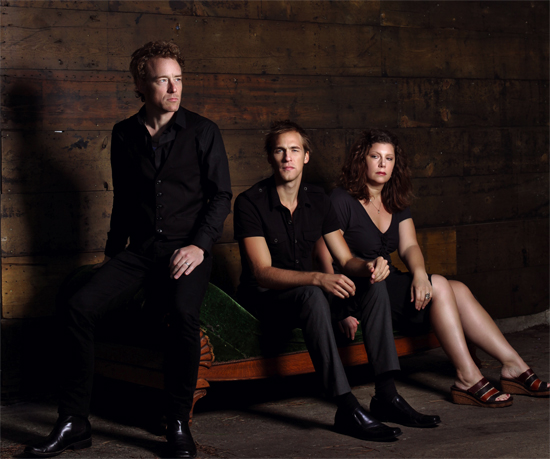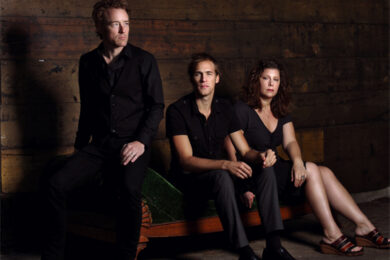“Steady as a train, sharp as a razor.” When I think about Low and the place this band has held in my heart for so long, it’s June Carter’s description of Johnny Cash’s sound in Walk The Line that seems the most apt – something undaunted and undiluted, run through with high-wire tension and untamed depths. Guitarist Alan Sparhawk formed the band in 1993 with his wife Mimi Parker on drums and John Nichols on bass. While the latter’s role was filled by a succession of bassists before current band member Steve Garrington joined in 2008, their sound has displayed a constancy that defies the shifting ways of the world as we know it.
And though this solid core has remained firmly in place, Low’s ongoing development has found them shifting and experimenting with each of their nine albums. From their 1994 debut I Could Live In Hope to their latest opus C’mon, released in 2011, they have continued to explore the chasms of possibility that Sparhawk and Parker’s two voices are able to open when singing together, in uncanny harmony. Sparhawk is a restless creative mind, exploring his musical curiosity across a range of compilation contributions, solo work and multiple side projects. His main musical outlet outside of Low is Retribution Gospel Choir, the driving, poppy, dub-influenced trio he formed in 2008 with Garrington and Eric Pollard on drums. Parker seems more elusive, but the power of her quiet presence on stage, as in person, is grounding, like bedrock. And it is their combined vocal power – along with their minimal instrumentation, where every single note, every drum stroke, counts – that sets the band apart. I’ve seen them silence a drunken London venue by simply standing side by side, in unaccompanied song. There’s nothing timid or delicate here.
Rather, Low show a fierce and uncompromising dedication to what music can do at its most pared down. Ahead of their Royal Festival Hall appearance on Tuesday [April 3] and Retribution Gospel Choir gigs in Sheffield and London thereafter, the Quietus caught up with Sparhawk and Parker in Kings Cross to talk about longevity, listening and playing really loud.
You’ve been around for almost 20 years, but your sound is still fresh and urgent. Where does that urgency come from?
Alan Sparhawk: Every time we sit down and try to write a song, we still feel like complete beginners. It’s a combination of not being real trained musicians and doing something that’s more off than normal. There’s still stuff we don’t know, and I think that’s the key. You see a lot of ageing bands, people who used to be famous and now are just going along, some start embarrassing themselves and there’s this big fear, “When am I going to cross that line?” You can’t completely go back to the naïveté of when you first started, obviously, but for some reason we’ve been lucky enough to keep a certain sense of it.
Mimi Parker: When I write a new song, even to this day, I’m surprised that I had another one in me…
AS: … Yeah, that something works out, that we end up with something we can stand. It’s a weird thing to do something for such a long time. And you constantly ask yourself, are you listening to the people who are listening to you, or are you just listening to yourself? Too much introspection can make bad art, and so can complacency.
MP: With a hit song, some artists feel like they need to keep creating something in that vein, because that works.
AS: Yeah, even if you’re going contrary to it, you’re still basing your career on it in some way, and you’re never really free from it. We’ve never really had any hits. We still get on stage with nothing. With nothing to lean on. And maybe that’s kept us on our toes.
I remember seeing you at Shepherd’s Bush Empire once and being astonished at how quiet that venue could get. You did an a cappella song and at that moment it seemed to me that this wasn’t music being performed so much as music you take part in, like the music I’ve grown up with in churches my whole life. Music that requires more listening than it does making sound. It seemed to me that the way you make music has a lot to do with listening.
AS: By the very nature of minimalist music, when you’re doing so little sometimes on stage you really become one with the very few things going on. If you draw an audience in with something quiet, then the mind is going to focus in on one or two things, and those two things are going to become loud and brilliant.
You referred to church. Maybe that’s also where it comes from. Church is a group of people in a space sharing a moment that has a certain frequency, or whatever you want to call it, going on – something musical, something spiritual, however you define it. There are these indescribable things that can happen with music. It happens in loud and intense concerts too, but perhaps it’s just more recognisable when it’s quiet. When we started the band, we knew most people weren’t going to want to listen to this, or have the patience for this, but that there’d be a few people who would resonate with it the way that we do. And from show one, there were two people crying and the rest of the people were leaving. It can be a very intense thing and a lot of people aren’t ready for that.
Personally when those moments happen, when someone does resonate with what we’re doing in that way, that’s everything to me. That’s the whole reason. Everything else about music can be explained away, but those moments are worth living and dying for.
Your lyrics are like enigmatic snapshots – really pared down, but with the ability to take you places. They remind me of Raymond Carver.
AS: When we first started, I remember it being a kind of inside joke that we’d have these five or six-minute long songs with only like four lines. It came from the minimalism. I’m a pretty hard editor of myself, I would rather not tell the whole story than overstay my welcome as the narrator, so to speak. I like the gesture of words, it suits my abilities.
MP: I really admire songwriters who can tell a story and go into detail and it all rhymes, but I have never been able to do that. My songs are more fragmented, which probably closer to how I think.
AS: Yeah, moments, a hint of a memory. Even Bob Dylan with all his words, it’s really only hitting these sparks and edges of imagery. Even his ballads are fragmented. That’s the nice thing with lyrics – you can get away with so much.
MP: The music can sometimes fill out the missing words.
I read an interview with Amadou and Mariam recently, where they started talking about their faith – they are Sufi muslims. And suddenly their lyrics took on this great depth that I’d felt there – their music became rounder, fuller. Does your faith inform the way you write?
AS: Well it informs the way everyone writes. Of course it does. It’s part of how you see the world, and who you are, where you came from, where you’re going. It’s the foundation of anybody who creates anything. Creation is an effort to be eternal, to live for ever. So I think everybody is influenced by that. Our religion puts a certain language to those things and sometimes it comes out in our lyrics, and I’ve always been pretty happy for it to come out in its own natural way. I didn’t have to think about it. It works well. The things that religion deals with are the same things that we deal with every day, the whole process of trying to create something is the same as wanting to live forever. It’s engaging the moment, and the past and the future have everything to do with that. Different language is used, depending on who you talk to, but I think anybody who creates something recognises that and is influenced by it on some level.
Where did Retribution Gospel Choir come from?
AS: In Duluth, where we live, there is a small music community, and you kind of get to know everybody and play with them. Retribution Gospel Choir just came out of knowing this drummer Eric Pollard. When we started playing together, there was immediately this energy – something about the way he plays and the risks he takes sort of works really well with the way I play guitar, it opens up this door. When we started there was a lot of improvising.
Did you have an idea of the sound that you wanted?
AS: No, it was just the sound of these three guys playing together. I know it brought different things out of each of us. It was a new freedom. A fill-in show came up so we just did it and it felt pretty good, so we did another one and then just kept going. We wrote a few songs, did a record fairly hastily and that got us on the road and it took off.
Is improvisation part of the way you work generally?
AS: Not in Low – we have the capability but somehow we never went there. From early on we were really controlled, the song structures were really tight. Plus, what are we going to do, you know? A big long blues solo? Low has had some more amorphous songs, like ‘Do You Know How To Waltz?’ from The Curtain Hits The Cast [1996] – a sound thing that would just grow and grow and grow. And we still have a few songs that are different every time we play them. But diving into completely free sound is more the way RGC went.
Maybe that’s where a lot of the energy comes from?
AS: Yeah, I think there’s some of that. I’ve always been into improvisation. In Duluth, people get together and do stuff a lot. But when it came to Low I guess we figured we shouldn’t move it around too much. It’s a different energy. And volume.
MP: Alan really wants to play loud.
AS: I mean, yeah, every guy who plays music wants to play loud! But I try not to think about these different things too much. I’m not being a different person, but you step into the room and it’s a different energy and it goes a different way. For the new Retribution EP, we wanted to make these super-clean, no-fat pop songs – I love a good pop song.
Retribution Gospel Choir play on Weds 4th April at The Harley, Sheffield and Thurs 5th April at the Old Blue Last, London. Low play Mon 2nd April at the Glee Club, Birmingham and Tues 3rd April at the Royal Festival Hall, London
Header photo by Sara Kiesling



